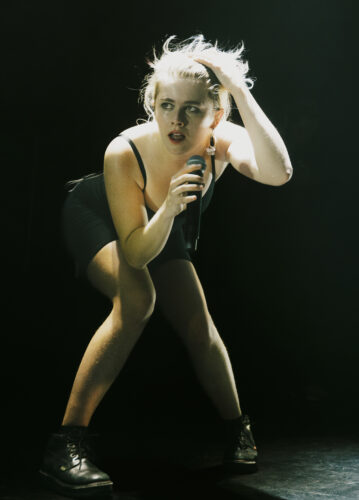If it was a material, it would be a metallic velvet; the texture both bouncy and rough; the movement somewhere between a silk-lifting breeze and the ripple caused by skip stones on a lake…While Zaho de Sagazan’s voice has a peculiar character to it, it soon seeps in as something familiar and powerfully intimate. That of a sister, a best friend, a shaman, a therapist? In any case, that of a unique writer, composer and performer. And her first album, La symphonie des éclairs, only confirms the buzz that has spread since 2022’s wave of events – namely a few outstanding shows at major festivals including newcomer support from le Printemps de Bourges and Les Francofolies de la Rochelle, the Chorus des Hauts-de-Seine prize, the Transmusicales de Rennes… Zaho de Sagazan, 23, sits with her dark-electro repertoire at the unlikely crossroads between greats such as Barbara and Christophe, alternative electro artist Koudlam, and Cold Cave, where French introspective chanson meets the rightful heirs of Kraftwerk. Her voice cuts through the emotions, tearing apart the peacefully seductive girl song blueprint. Zaho harnessed her voice as she did her music, by working relentlessly and with great pleasure. At first, the piano was associated with chocolate doughnuts, which were her reward after each lesson during the classical training she started in 6th grade. While she eventually got sick of it, she returned to it a few years later. Her obsessive and self-taught passion is reflected in her current writing – as she launches the melodies in a straight line, repeating the same two chords to the point of hypnosis.
In her teens, she developed a passion for classical French chanson, admiring Maurice Fanon’s wordplays on “L’Écharpe” or Barbara’s on “Du bout des lèvres”, as they touch on the most intimate truth of emotions. She also passionately explored the type of dark electronica that delves deep into the soul and thumps through the body with great fury. Everything came together at once: this great dreamer grew up guided by the maternal insight of ‘putting herself in others’ shoes”, which was both a charitable stance and a wonderful way to hone her observation skills. Whether her songs are written from the “I”, ”you” or “he” perspective, the subject never changes: a person that loves, suffers, is unsure, looks at themselves in the mirror, and explores further…For this person isn’t always Zaho herself. “I’ve never experienced love. So I invent it, trying to understand it before I get to live it”. Once she slips into character, one elated with love, she can keep on singing on
her piano forever. As on “Suffisamment”, “Je t’aime passionnément / Tu m’aimes suffisamment / Pour que je reste / Mais pourquoi je reste / Sûrement parce que je t’aime / Passionnément “. (editor’s notes: I love you passionately / You love me just enough / For me to stay / But why do I stay? / It must be because I love you / Passionately) she sings in a loop, both in despair and exaltation, from a realistic but also dreamed perspective. “I was in tears when I wrote this”. Throughout the album, Zaho de Sagazan alternates between spleen and bliss, experiences elated highs and sobering lows, desire and sublimation, as she explores relationships (Langage, Dis-moi que tu m’aimes, Je rêve, Suffisamment), romantic fantasies ( Les garçons, Mon inconnu), bold self-portraits (Tristesse, Mon corps, La symphonie des éclairs), disturbing meditation (La fontaine de sang), or simply invites the listener to follow into her liberated and ardent world (Ne te regarde pas). Zaho is truly a unique and distinctive artist, one of today’s timeless voices.

